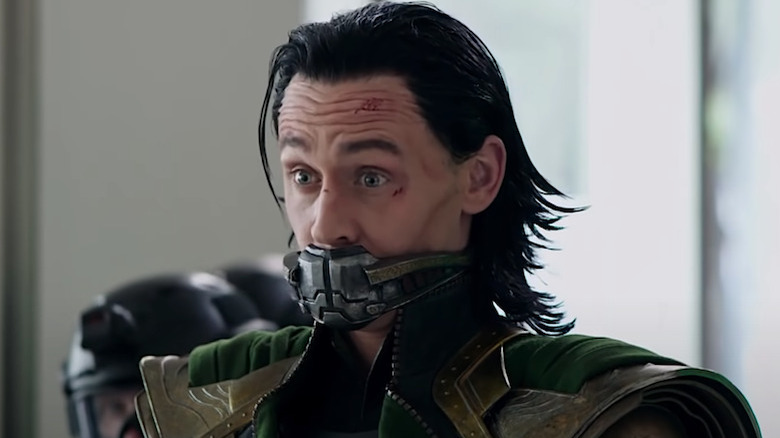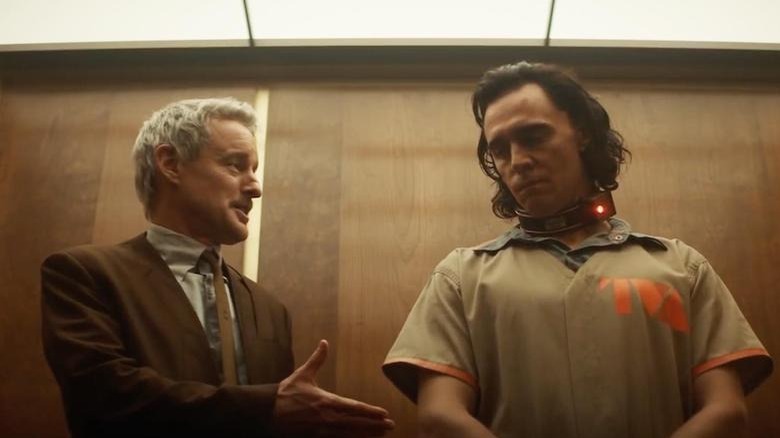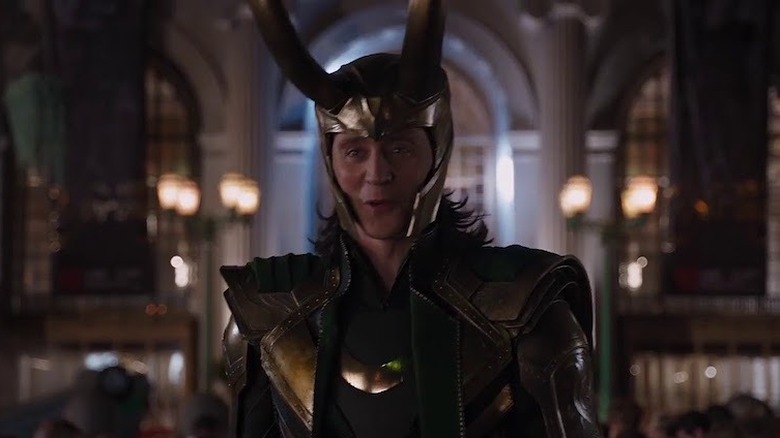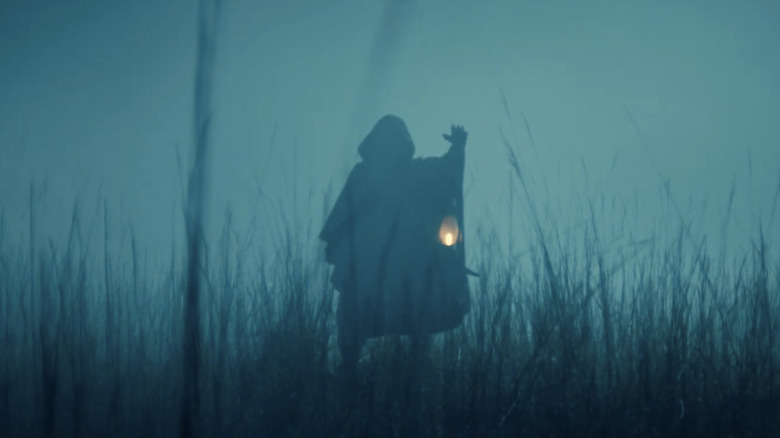Loki Episode 1 Ending Explained
Contains spoilers for "Loki" Episode 1
It might've taken over two years, but Marvel Studios' "Loki" series starring Tom Hiddleston is setting out to explore where the titular God of Mischief disappeared to when he grabbed the Tesseract during "Avengers: Endgame." Enter the Time Variance Authority. They're an extra-dimensional agency tasked with "preserving the sacred timeline," which is dictated by the Time Keepers — or "three space lizards," as Loki likes to call them. And after just one episode of the Disney+ show, it's pretty clear that things are going to get very, very strange.
For most of the show's inaugural episode, the God of Mischief has to grapple with the idea that his whole life has technically been meaningless, as Owen Wilson's Agent Mobius gradually explains that everything happens in the timeline pretty much as the Time Keepers allow it to. In fact, the series takes us out of the timeline itself and analyzes some of the biggest moments in the Marvel Cinematic Universe from an outside perspective. It's hard to compare "Loki" to the other Marvel shows on Disney+, because it's a completely different type of weird to "WandaVision" and it's painting a much bigger picture than what we got in "The Falcon and the Winter Soldier."
"Loki" spends most of its first episode establishing the TVA's cosmic bureaucracy, with its retro-analogue technology and varying shades of beige or brown. But the idiosyncratic show also wastes no time in setting up the main mystery — so here's how Loki kicks off a weird new chapter in the MCU.
Tying up loose Endgames
From the minute Episode 1 starts, "Loki" is making something very clear: This will be an in-depth dive into what makes the God of Mischief tick. This is the version of the character who was apprehended just after the events of "The Avengers," after all, so he hasn't had the huge redemption arc through "Thor: The Dark World," "Thor: Ragnarok,” and "Avengers: Infinity War" that audiences have witnessed so far.
So, when the TVA picks Loki up in the Gobi Desert in Mongolia, he's not exactly cooperative. Which makes it pretty fun when one of the Hunters (Wunmi Mosaku) knocks him out in slow-motion, before carting him off to the TVA's headquarters and resetting the timeline with a device called a reset charge. When Loki arrives at the TVA's offices, he's constantly trying to fight them off and escape. His selfish, manipulative nature bleeds through every single conversation he has, no matter who he's speaking to. And later, when Judge Ravonna (Gugu Mbatha-Raw) is sentencing Loki for his crimes against the timeline, he's still trying to worm his way out of the situation and pass the blame on to someone else. It's classic Loki.
But the TVA constantly refers to our hero as "Variant L1130," because it's important to remember that the series isn't following the main version of Loki, the one who died at Thanos' hands in Avengers: Infinity War. When the Hunters used their reset charge in Mongolia, they closed the new timeline branch Loki created when he escaped with the Tesseract. However, it's not entirely clear just how far the effects of reset charge go. As Judge Ravonna tells Loki during his "trial," the Avengers were supposed to go back in time to retrieve the Infinity Stones — meaning their disruptions of the timeline are Timekeeper-approved. Just how far back did this particular repair of the timeline go?
Regardless of the overall effects of the reset charge, thanks to the intervention of Agent Mobius, this mischievous Loki variant is allowed to live ... for now, at least.
Meeting Mobius
Wow. It's okay, you can say it: Owen Wilson brings an amusing air to the MCU as Agent Mobius. He's a welcome addition here as his laidback, casual nature helps the weirder elements of the series go down a little easier. "Loki" introduces Mobius as he's in the middle of hunting a particularly violent variant in France, 1549 — although the writers are careful not to mention exactly who this variant is. After all, Mobius does take a unique interest in Loki's case while he's still in the middle of his investigation.
Although the bureaucratic nature of the TVA might make its employees seem a little cold, Mobius clearly has a softer side, which we see when he tries to get more information from the French child about what happened in the church and who killed the Hunters. The kid ominously points towards a stained-glass window depicting the devil, and who else is well-known for wearing a set of horns in the MCU? You guessed it...
Anyway, as entertaining as he is, Mobius has a role in the show — at least initially. He's smoothing over any questions that Loki (or the viewer) might have about the TVA and what they do. But because it's Owen Wilson, we're not complaining. However, he's also the stepping stone to understanding Loki on a psychological level, as he does a masterful job of getting under his skin in one of the best scenes in the episode.
Loki Laufeyson, this is your life!
When Mobius takes Loki into a room called the "Time Theater," the pair rewatch some of the key moments in the Asgardian's life. This includes a brilliant scene where Loki is revealed to have been D.B. Cooper, the real-life man responsible for hijacking a plane in the 1970s for a $200,000 ransom before seemingly disappearing. The answer to this bizarre historical mystery? Heimdall (Idris Elbia) zipped Loki out of the sky using the Bifrost.
Yes, that's hilarious, but it's only to catch audiences off guard as the conversation takes a much deeper turn and puts Loki's lifelong motivations under the microscope — specifically, his desire to rule. Why is Loki like this? Why does he want to rule Midgard, the Nine Realms, and Asgard itself? The former prince is forced to take a long, hard look at himself and the ramifications of his actions, even reckoning with the fact that he's destined to get his own mother killed by sending the Dark Elves up a specific set of stairs in "Thor: The Dark World."
But it all boils down to one question: "Do you enjoy hurting people?" It's only after Loki later realizes the inconsequential nature of the Infinity Stones within the TVA that he's completely honest with who he really is. By watching his own life — and his brutal death at the hands of Thanos – play out in the Time Theater, he finally embraces the truth. Loki's violence is a "cruel elaborate trick" to make himself seem like a terrifying person so people will fear him, even though he himself thinks he's weak.
Oh Loki, you just saved yourself a very expensive therapist's bill.
Violent Variant
After Loki's personal growth session, Mobius reveals the real reason that he's trying to work with him: There's another variant of Loki running around the timeline, killing the TVA's Hunters and generally causing chaos. What's the best way of tracking down a vicious variant of Loki? Use another variant to get a better insight into the way the God of Mischief thinks and why he constantly engages in this level of violence. The thoughtful conversation Mobius and Loki had will no doubt come in handy when they eventually confront this alternate version of the Asgardian.
"Loki" Episode 1 then quickly cuts to 1859 Salina, Oklahoma, where a group of Hunters go searching for someone who's messed with the timeline and is trying to get rich by drilling for oil in the past. Oh, if only that was the case. A hooded figure is revealed to be waiting for the squad, setting them on fire with the oil in the field in a brutal moment. Is this one of those "cruel elaborate tricks" Loki just opened up about?
This is the same hooded figure who's briefly seen in the "Loki" trailers, and many people are expecting this to be revealed as Lady Loki, since Sophia Di Martino has long-been rumored to be playing the character (via Deadline). In the Marvel comics, Loki has taken the form of a woman from time to time, but it's typically been just another form for the same character. Meanwhile, if the variant the TVA is hunting does turn out to be Lady Loki, it'll be interesting to see how the timeline diverged in a way to create her, how she escaped, and what she wants. But we'll just have to wait a week to find out more.




